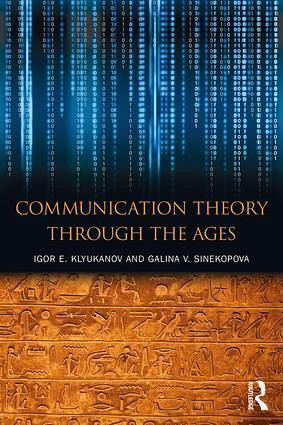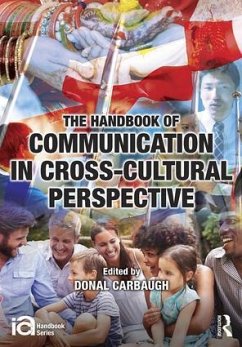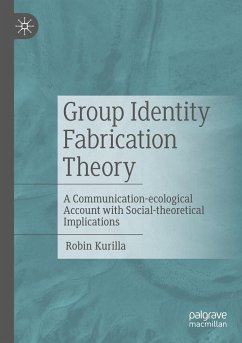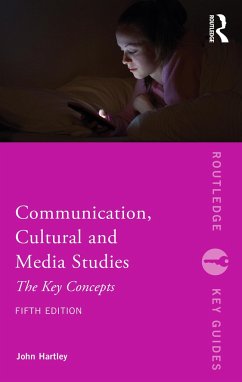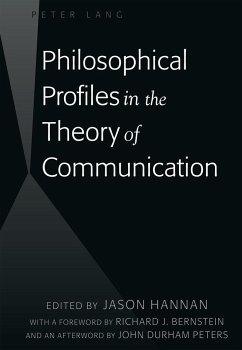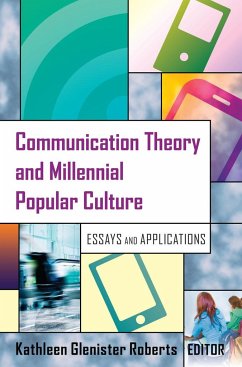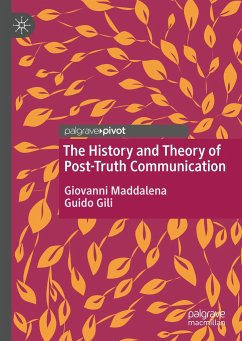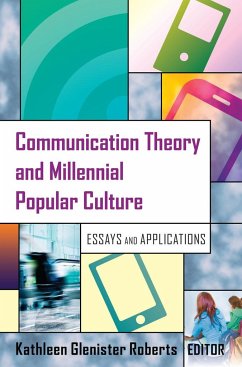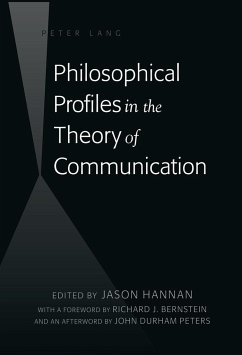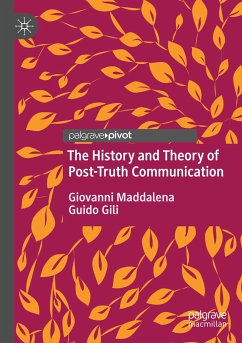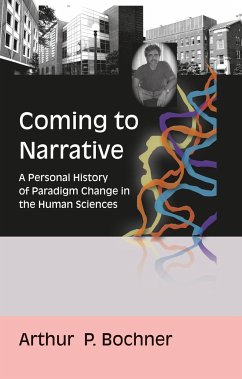Communication Theory Through the Ages
Versandkostenfrei!
Versandfertig in 1-2 Wochen
Weitere Ausgaben:

PAYBACK Punkte
28 °P sammeln!





Communication Theory Through the Ages presents communication theory as a journey through history by way of asking engaged questions. Encouraging intellectual vitality, the authors show students step by step how theoretical ideas are interconnected and lead to an increasingly complex understanding of communication. Students will be motivated to ask questions as they encounter historical figures, social events, and artifacts, resulting in a richer understanding of the biographical, cultural, and social context for communication theories.
Igor E. Klyukanov is Professor of Communication in the Department of Communication Studies at Eastern Washington University, U.S.A. He has authored numerous articles, book chapters, and books in communication theory, semiotics, translation studies, general linguistics, and intercultural communication. His works have been published in the U.S., Russia, England, Spain, Costa Rica, Serbia, Bulgaria, India, and Morocco. His textbook Principles of Intercultural Communication has been adopted by over 30 colleges and universities in the U.S. His monograph A Communication Universe: Manifestations of Meaning, Stagings of Significance won the 2012 NCA Philosophy of Communication Division Distinguished Book Award. He is also the translator and editor of Mikhail Epstein's book The Transformative Humanities: A Manifesto. He served as an associate editor of The American Journal of Semiotics and is the founding editor of Russian Journal of Communication. Galina V. Sinekopova is Professor of Communication in the Department of Communication Studies at Eastern Washington University, U.S.A. She has published articles in such journals as Journal of Communications, Journal of Language and Social Psychology, and Listening: Journal of Communication Ethics, Religion, and Culture. Recently, her chapter (co-authored with Igor E. Klyukanov) on the press in post-Soviet societies has appeared in The Handbook of Media and Mass Communication Theory. She has presented her research at conferences in the U.S., Canada, China, Taiwan, Turkey, Russia, and Bulgaria. She served as a guest editor of two issues of International Journal of Communication.
Produktdetails
- Verlag: Routledge / Taylor & Francis
- Artikelnr. des Verlages: Y177217
- 1st ed.
- Seitenzahl: 356
- Erscheinungstermin: 15. Februar 2019
- Englisch
- Abmessung: 229mm x 152mm x 19mm
- Gewicht: 566g
- ISBN-13: 9780765646767
- ISBN-10: 0765646765
- Artikelnr.: 53188663
Herstellerkennzeichnung
Libri GmbH
Europaallee 1
36244 Bad Hersfeld
gpsr@libri.de
"This masterfully and engagingly written book provides a panoramic view of the wonder and function of communication theory from ancient to contemporary times. With an insightful perspective, the authors creatively, yet with crystal clarity, connect the theoretical dots to provide insights that help the reader see interconnections between communication theory and practice. This is a must have book for any communication educator, and for all communication scholars and students who seek a new appreciation for the power and importance of communication. The best word that summarizes how this book enhances our understanding of communication theory in relation to such fresh contextual applications as time, the mind, God, language, culture,
Mehr anzeigen
information, community and space is 'Wonderful!'"
-Steven A. Beebe, Ph.D., Regents' and University Distinguished Professor Emeritus, Texas State University, USA
"In today's globally connected world, communication functions as the human action binding us all together. Our shared destiny emerges from our history and our culture. Communication Theory Through the Ages takes us on a guided tour of the questions each generation asks of itself, and , the answers that other generations suggest we engage. The experiential wisdom of philosophy blends with the eloquence of rhetoric resulting in a pedagogy of discovery. Students and teachers, beginners and professionals, will delight in the mindful journey of this book written for our time!"
Richard L. Lanigan, Laureate Fellow and Executive Director, International Communicology Institute, Washington, DC, USA
"Some ontological inquiries about the human 'wonderland' - existential in time and space, with body and mind, from individual to community perspectives, on me and God, of language and culture - are offered in this book. The authors play the excellent role of guides taking their readers to 'must-see' spots of the human wonderland with some interesting stories of their observation. The best part of the journey to this wonderland will begin when a reader empirically engages in exploring his/her existential wonderland. And, on this journey if the reader happens to meet his/her 'subject,' witnessing all along, he/she might confirm if all is in the mind."
Du-Won Lee, Ph.D., Professor, Department of Media Communication Studies, Chongju University, South Korea
"Be ready to take 'a journey' when reading this book. When explaining such key concepts as communication, language, and the body, you are led on an intellectual journey: spanning from the writings of the ancient Greeks, to the modern Germans and Russians, to the post-modern scholars Habermas and Derrida. Yet fear not losing your way on this journey! The authors write in a down-to-earth style and illustrate their points with poignant and relevant examples. This is a book highly recommended for those who want to break away from the standard fare of one-theory-after-another texts, and instead study communication as a dialogue that moves across time and place. You will be richly rewarded when reading this book."
Todd Sandel, Professor of Communication, University of Macau
"This book is utterly different from what is provided by the mainstream of media studies, innundated as it is with contemporary topics on issues such as digitalization and social media. Igor Klyukanov and Galina Sinekopova take us on a journey offering a bird's eye view of communication theory through ten philosophical windows. We are regaled with intellectual stimulation drawing on the rich tradition from Plato to Foucault. A most welcome reminder of the power of and usefulness of such Renaissance-type overviews in an age that diverts us increasingly to specificities and presentism."
Kaarle Nordenstreng, Professor Emeritus of Journalism and Mass Communication,
the University of Tampere, Finland
"[...A] valuable addition to a communication theorist's collection, [and for] students and scholars interested in linguistics, sociology, theology, semiotics, history, psychology. [...T]he reader may feel inspired to believe that communication, as a specifically human phenomenon, has the potential to encourage people to be better humans and strive to become more humane as well."
Elena Fell, European Journal of Communication
-Steven A. Beebe, Ph.D., Regents' and University Distinguished Professor Emeritus, Texas State University, USA
"In today's globally connected world, communication functions as the human action binding us all together. Our shared destiny emerges from our history and our culture. Communication Theory Through the Ages takes us on a guided tour of the questions each generation asks of itself, and , the answers that other generations suggest we engage. The experiential wisdom of philosophy blends with the eloquence of rhetoric resulting in a pedagogy of discovery. Students and teachers, beginners and professionals, will delight in the mindful journey of this book written for our time!"
Richard L. Lanigan, Laureate Fellow and Executive Director, International Communicology Institute, Washington, DC, USA
"Some ontological inquiries about the human 'wonderland' - existential in time and space, with body and mind, from individual to community perspectives, on me and God, of language and culture - are offered in this book. The authors play the excellent role of guides taking their readers to 'must-see' spots of the human wonderland with some interesting stories of their observation. The best part of the journey to this wonderland will begin when a reader empirically engages in exploring his/her existential wonderland. And, on this journey if the reader happens to meet his/her 'subject,' witnessing all along, he/she might confirm if all is in the mind."
Du-Won Lee, Ph.D., Professor, Department of Media Communication Studies, Chongju University, South Korea
"Be ready to take 'a journey' when reading this book. When explaining such key concepts as communication, language, and the body, you are led on an intellectual journey: spanning from the writings of the ancient Greeks, to the modern Germans and Russians, to the post-modern scholars Habermas and Derrida. Yet fear not losing your way on this journey! The authors write in a down-to-earth style and illustrate their points with poignant and relevant examples. This is a book highly recommended for those who want to break away from the standard fare of one-theory-after-another texts, and instead study communication as a dialogue that moves across time and place. You will be richly rewarded when reading this book."
Todd Sandel, Professor of Communication, University of Macau
"This book is utterly different from what is provided by the mainstream of media studies, innundated as it is with contemporary topics on issues such as digitalization and social media. Igor Klyukanov and Galina Sinekopova take us on a journey offering a bird's eye view of communication theory through ten philosophical windows. We are regaled with intellectual stimulation drawing on the rich tradition from Plato to Foucault. A most welcome reminder of the power of and usefulness of such Renaissance-type overviews in an age that diverts us increasingly to specificities and presentism."
Kaarle Nordenstreng, Professor Emeritus of Journalism and Mass Communication,
the University of Tampere, Finland
"[...A] valuable addition to a communication theorist's collection, [and for] students and scholars interested in linguistics, sociology, theology, semiotics, history, psychology. [...T]he reader may feel inspired to believe that communication, as a specifically human phenomenon, has the potential to encourage people to be better humans and strive to become more humane as well."
Elena Fell, European Journal of Communication
Schließen
Für dieses Produkt wurde noch keine Bewertung abgegeben. Wir würden uns sehr freuen, wenn du die erste Bewertung schreibst!
Eine Bewertung schreiben
Eine Bewertung schreiben
Andere Kunden interessierten sich für




